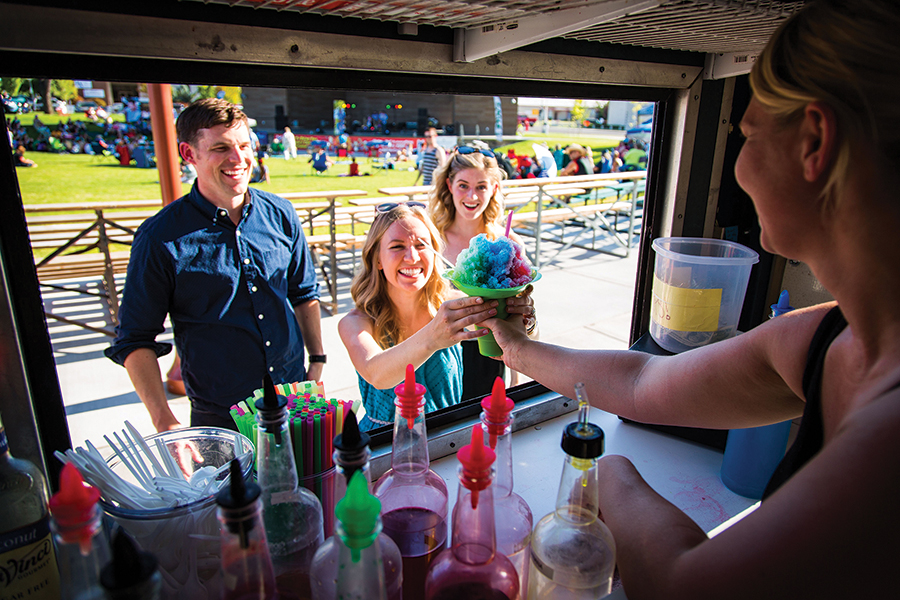
Home » Visit Tri-Cities drops membership dues as it pivots to storytelling model
Visit Tri-Cities drops membership dues as it pivots to storytelling model

July 14, 2021
Visit Tri-Cities, the tax- and fee- funded agency responsible for putting heads in hotel beds, is dropping its paid membership model in favor of a storytelling approach that includes high-quality videos and images.
The shift away from the $250 “basic” membership program ($185 for nonprofits) began before the Covid-19 pandemic knocked the industry to its knees. The shutdown only accelerated its desire to shine a light on people, places and things that are relevant to visitors, said Michael Novakovich, president and chief executive officer.
“If we’re not talking about the whole community, how are we going to bounce back?” he said.
It bought high-quality camera equipment, including a drone and 360-degree cameras, and trained an employee to be a certified drone pilot.
The new approach makes its formal debut in early August, when Visit Tri-Cities debuts a website that is lighter on text and stagnant content and heavier on dynamic content that includes videos and a new focus on videos and profiles at its current address, visittri-cities.com.
Different products target tourists, travel writers, event planners and sports tournament organizers.
The annual Visitor’s Guide is a telling example of how it is altering its approach.
The annual guide included an extensive directory of members, a phone book style approach that didn’t suit visitors and was all but useless in the era of smartphones. While Visit Tri-Cities appreciated having non-tourism businesses such as plumbers as members, listing them in a visitor guide did little to further its heads-in-beds mission.
“Visitors don’t care,” he said.
Instead, the guide will be released seasonally with content that reflects what’s happening in the community, be it the annual Water Follies or Spring Barrel Tasting or any of the myriad activities on the civic calendar each year.
Novakovich said dropping the paid basic membership model will free staff from the challenge of selling memberships and chasing unpaid dues. The agency will depend on its traditional sponsors, such as Battelle, Washington River Protection Solutions and Bechtel National, as well as visitor taxes and paid advertising on its products to support its budget.

Tourism-related businesses, including restaurants, retailers, beverage and eating establishments and sports-oriented venues can apply for free memberships. Novakovich hopes that some of the non-paying members will use the money they formerly allocated to membership dues to advertise in its online and print publications.
The shift away from what he called a chamber of commerce-style membership model is not unique to the Tri-Cities. Nationally, tourism agencies are moving away from a membership focus to a storytelling one.
For the local one, the pandemic helped accelerate the change.
“Covid provided a lot of opportunity,” Novakovich said.
The opportunity of course came with a downside. Pandemic-related closures hammered the tourism industry. Tasting rooms, museums and the other visitor-friendly destinations shut down. Visit Tri-Cities deferred membership dues for its most affected members.
Local tourism spending had a $345 million impact in 2020, down 30% from the record $490 million impact in 2019, when the industry supported 5,600 local jobs.
Revenue Per Available Room, or RevPAR, a common industry metric, was down 6% compared to a year ago, with the caveat that the market added more than 300 hotel rooms so average room revenue was probably going to fall anyway.
Nationally, leisure travel is expected to return to 2019 levels by 2022.
In the Tri-Cities, sports tourism is leading the revival.
The Mid-Columbia was already a popular locale for sports tournaments. Event organizers were quick to book events when Washington reopened on June 30 after 15 months of restrictions on gatherings to prevent the spread of coronavirus.
“As soon as the gates were open, they were able to book events here on short notice,” said Hector Cruz, vice president for sports marketing.
A recent National Softball Association of Washington tournament brought 100 teams to town to play more than 200 games – during the hottest weeks of June. Organizers rescheduled around the heat, but the games went on, with the champion named by Sunday evening.
The influx filled local hotels to an occupancy rate of more than 95%. Those visitors filled restaurants, stores and other local businesses.
The Wild West Bass Trail Columbia River Pro Am series in late July is expected to bring nearly 500 boats to town, and of course, Water Follies is back on.
But business travel will not revive until 2024, according to projections by U.S. Travel Association, a research firm.
“The pandemic sucked the wind out of the sails in that regard,” Novakovich said.
Local News Hospitality & Meetings
KEYWORDS july 2021





